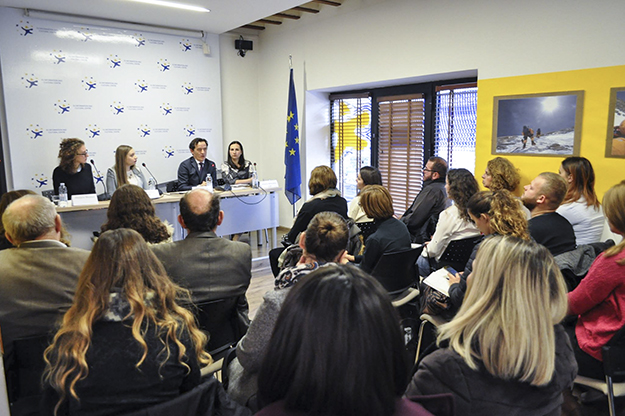This year the Youth Initiative for Human Rights in Kosovo (YIHR) is marking Human Rights Day by organizing the fourth edition of “Human Rights Week” in Prishtina. Through a series of activities the annual event, which started on Dec. 4 and will end on Human Rights Day itself, Dec. 10, will mainly revolve around the issue of respecting human rights in Kosovo.
The first activity was held on Monday (Dec. 4), a discussion titled “Access to education.” Participants in the discussion were Hilmi Jashari, Kosovo’s Ombudsman; Alberta Alihajdari, an education expert and member of the German Society for International Cooperation (GIZ); and Ilirjana Geci, member of the Kosovar Forum for People with Disabilities.
Jashari stated that the education sector is one of the fields in which the most drastic violations of human rights are committed in Kosovo. “You needn’t be an expert in the field to reach this conclusion. It is clear that in most cases, schools in Kosovo do not provide physical access for people with disabilities, thus most of these people are excluded from the sector,” Jashari said.
According to Jashari, it is important to initially guarantee equal access for all people to school facilities, before moving on to other issues, which are plentiful in Kosovo’s education sector. The Ombudsman stated that although Kosovo’s legislation is well adapted, and in line with international legislation regarding the provision of education opportunities to disabled children, their access to education in practice is lacking, since the law has remained only a promise, instead of being implemented. Laws in Kosovo guarantee the involvement of all children in education, but in practice this does not happen.

Photo courtesy of Youth Initiative for Human Rights.
Jashari stated that this lack of implementation by competent ministries and the government in general should elicit a natural counter-reaction from the Kosovo Assembly. This institution, which according to the Constitution serves the role of overseeing the Government, should utilize its right and seek accountability from the Government.
“94 percent of Assembly work [in the last mandate] was oriented towards approving laws and only 6 percent in seeking accountability from the Government,” said Jashari, citing data obtained from monitoring conducted by the office of the Ombudsman during the last Assembly’s mandate.
“In normal conditions, a democratic state that shows such a parliamentary performance cannot function properly,” he stated. According to him, it is also important to have the voice of civil society heard more, as well as to consider contributions and recommendations which are given by different organizations.
Alberta Alihajdari of GIZ agreed with Jashari’s views. She also spoke about the lack of access to education for disabled children as a key issue regarding violations of human rights in education, saying that inclusion is a precondition for qualitative education.
“There are a multitude of violations, especially against certain groups such as minorities, the LGBTI community and people with disabilities,” said Alihajdari. She went on to say that most people of these communities do not have any access to education.

